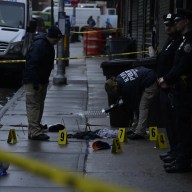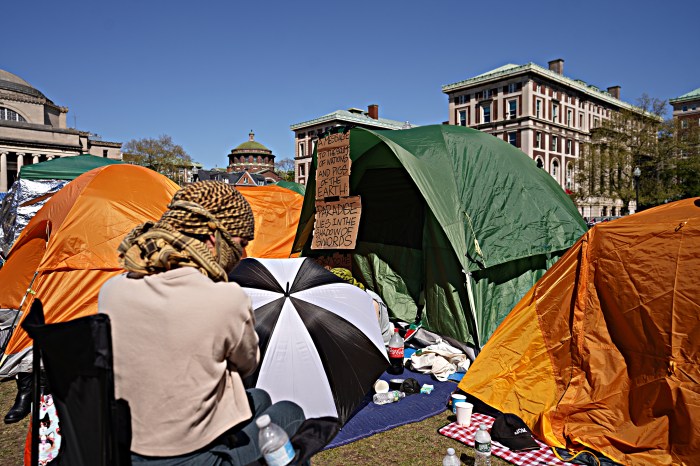By Adam Kramer
A group of community leaders appeared before the city Board of Standards and Appeals recently to again voice their opposition to the construction of a proposed Jamaica Avenue motel.
Members of Community Board 13, the Wayanda Civic Association and Connie Robinson-Turner, a representative of state Assemblywoman Barbara Clark's (D-Queens Village) office, appeared before the board Jan. 11 to plead their case against the completion of the Paradise Motel at 220-16 Jamaica Ave.
Work on the partially constructed shell of the $3.2 million, 54-room motel is at a standstill as the city tries to decide whether or not to give the owners, Jitendra Bhatt and his brother Bharat Bhatt, of Farmingdale, the zoning variance they seek in order to complete the construction.
Peter Richards, president of the Wayanda Civic Association, said the Queens Village community is opposed to the construction of the hotel because there is a fear that it will turn into a transient, or “hot sheets,” motel. His concern is that the hotel is so far from Kennedy Airport – about 10 miles – it will need to have day rates in order to maintain acceptable occupancy rates.
Eric Palatnick, a lawyer for the builders, has repeatedly said the motel will not be turned into an hourly rate operation and his clients are being persecuted for a crime they have not committed.
The BSA hearing allowed the developers to respond to questions that had been previously raised by the board about why the they should receive a variance to continue building the hotel.
Pasquale Pacifico, executive director of the BSA, said the developers' lawyers answered the board's questions during the Jan. 11 meeting. But the board had additional questions, which the developers are expected to answer during a BSA meeting Feb. 29.
The board will make its decision about the fate of the motel after all its questions have been answered, he said.
The board's purpose is to protect the individual landowner from becoming encumbered by losses, said Pacifico. In addition, if the hotel is the only option for the property, that weighs heavily on the board's decision, but if the board is convinced there are other alternatives, such as senior housing, it might permit the variance for such a development.
“The BSA's goal is to protect the landowner and look at community impact,” he said.
Pacifico said Palatnick presented the case for the hotel by focusing on three main points: the hotel will improve the neighborhood, there is a need for it and the developers are facing financial hardship.
According to Richards, Palatnick argued the developers planned to attract clients to the hotel by charging lower rates than the other hotels in the vicinity, which would attract middle-income families and businessmen and women from the airport.
“The BSA objected to this concept,” Richards said. “They said any respectable business would think twice about sending their employees so far from the airport just for economical reasons.”
Palatnick said in a telephone interview the rates would not be low enough to attract transients, but the hotel would be an economy hotel, which has worked out a franchise agreement with the Cendant Corporation of Parsippany, N.J., a hotel/motel chain.
“The corporation will fly a flag from the property and it will hold to the standards of the company they are franchising from,” he said.
The association with a major motel chain will help to lower vacancy rates because of their central booking system, he said. If a person calls the chain's office, he or she will be told of hotels at different locations for certain prices.
Both Richards and Pacifico said Palatnick argued before the board that truckers would be a target group for the hotel to boost its occupancy rates, but over the phone Palatnick said truckers were only a small part of the business.
“Queens Village will become like a cattle ranch with truckers coming to the hotel who were not bused in from JFK parking on the street, causing a traffic nightmare,” Richards said.
He said the part of Queens Village near the hotel is a high-density area and the incoming traffic will make the situation, especially parking, even worse.
“The community is looking at the past, not towards the future,” Palatnick said. “New York is doing well and this could be a good thing for the community. It is not just a fly-by-night operation. There is a lot of money involved.”
According to the city Buildings Department, Bhatt received permission to build the motel in 1989. A change in the zoning law in 1990 made it unlawful to build transient motels or hotels in commercial districts.
The Wayanda Civic Association has said the developers' lawyers have based their right to a zoning variance on previous BSA precedents and work permits twice issued by the Queens Buildings Department, even though the area was not zoned for a motel.
The Feb. 29 meeting will be held at 40 Rector St. in Manhattan, on the sixth floor. For more information, call Community Board 13 at 464-9700.
























